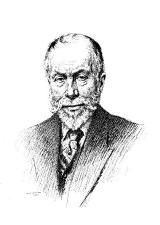Inspired, Unselfish Mr. Everyman
By Robert Lynd
Ernest Rhys, who died on Saturday at the age of 86, will be remembered as the editor of the greatest venture in popular publishing this country has known.
When he began to edit "Everyman's Library" he and his publisher, J. M. Dent, dreamed of creating a library of the world's best literature in a thousand volumes to be sold at a price within reach of everybody; and he lived almost long enough to see his dream fulfilled, for the 982nd volume appeared only a few weeks ago.
Himself a good poet and prose-writer, he was on affectionate terms with his fellow-writers—both the famous and those who were to become famous. It was of them, not of himself, that he loved most to talk out of a wealth of shrewd and humorous memories. The young Bernard Shaw and the young W. B. Yeats, the young Edward Thomas and the young D. H. Lawrence were among those with whom his wide literary responsiveness brought him in contact at one time or another.
It is doubtful, however, whether any of the writers of genius he knew made a greater contribution to human happiness in the English-speaking world than he himself did—an inspired editor and one of the most selfless of men.
The fineness of his character was all the more conspicuous since he never received either in money or in honours the rewards that were his due. He was in such straits, indeed, during the First World War that he was compelled to sell many of his books to pay his bills, and in later years he had to accept a Civil List pension of £100.
Yet he uttered no complaint against life, and in his reminiscences he tells quite a rose-coloured story of his rescue from poverty on the first of these occasions. After selling his books he got an unexpected message, he relates, to go round and see Everard Meynell in his shop.
When I reached the shop he asked me, with an air of mystery, to step into his private room, and made a surprising gesture. A certain shipowner, who had world-wide dealings in merchant shipping and made a fortune out of them in the war, had decided to put aside a sum for the benefit of painters, poets and other artistic folk who had suffered in the hard times. With that explanation, Meynell produced a cheque and made it out to me on one condition: I was not to know the name of the donor or make any acknowledgement whatsoever.
As one reads Rhys's memoirs it is hard indeed not to think of him as a lucky man. He tells, for example, how he owes his first editorship of a great series of books, the Camelot Classics, to a piece of luck when he was called on by a publisher in mistake for another Welshman, Sir John Rhys. Lucky again was his marriage to that fine artist in words, Greer [sic—actually, Grace] Rhys, to praise whom was to be his friend for life.
And he was continuously lucky in his meetings with great men and his conversations with them. How charming is the story of his talk with Walt Whitman:
He told me that once, when he was a young man and very hard up, he heard that a prize of 200 dollars was to be offered for the best temperance story. "Well," said Whitman, "I don't know I had any strong feeling about drinking either way, but I wanted the money, and I decided to have a try at it. So I bought a small keg of rye whisky." He left one to infer that the best way to write on temperance was to experience in oneself the symptoms induced by strong liquor. When the little keg was finished, the temperance book was finished, too, and it carried off the prize.
One can guess from stories like this with what courageous gaiety Ernest Rhys looked back on a long life not without its disappointments and struggles.
